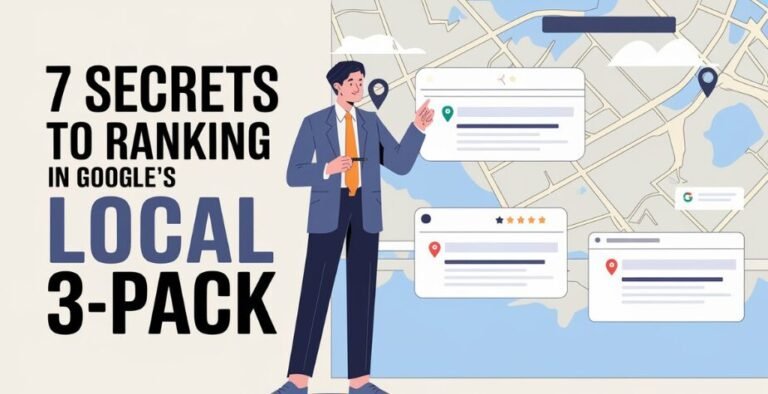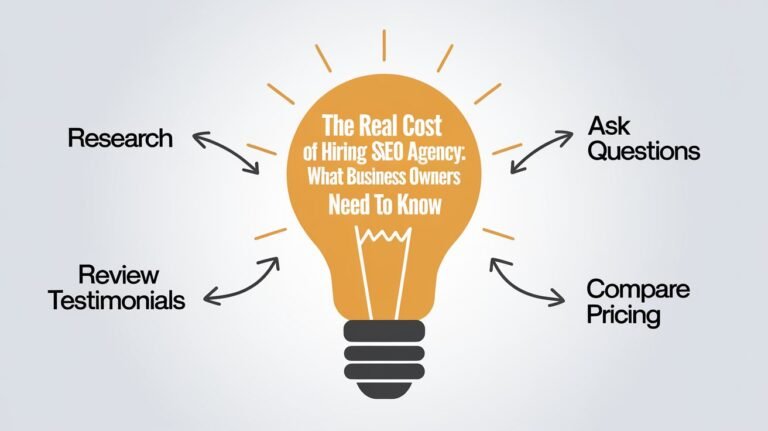SEO Myths Debunked: What Business Owners Need to Know to Rank on Google
Search Engine Optimization (SEO) often seems like a complex, intimidating world reserved only for tech experts.
Many business owners feel overwhelmed by the jargon, strategies, and constant algorithm updates, believing that SEO is beyond their reach.
However, the truth is that SEO is accessible to anyone willing to learn the basics.
This article will debunk common SEO myths and provide you with clear, actionable steps to improve your website’s search rankings, even if you’re new to the game.
- SEO is not just for experts: Anyone can implement basic SEO strategies.
- You don’t need to spend a fortune: Effective SEO can be done with minimal budget.
- SEO is an ongoing process: It's about consistency and patience.
- Quality over quantity: Focus on high-quality content rather than keyword stuffing.
What is SEO?
SEO, or Search Engine Optimization, refers to the process of optimizing your website to make it more visible on search engines like Google.
This visibility is crucial because it helps potential customers find your business online when they search for products or services related to what you offer.
Contrary to popular belief, SEO isn’t solely about complex technical changes.
It’s about understanding what your audience is searching for, creating valuable content that addresses those needs, and ensuring your website is user-friendly and accessible to search engines.
Why SEO Matters for Business Owners
In today’s digital age, having a strong online presence is essential for business success.
SEO plays a critical role in building that presence. When done correctly, SEO can drive targeted traffic to your website, increasing your chances of converting visitors into customers.
For small businesses, in particular, SEO can level the playing field against larger competitors. By focusing on local SEO and optimizing for relevant keywords, even a small business can appear prominently in search results.
For example, optimizing your site for local search terms can help you reach customers in your area who are actively looking for the services you provide.
Common SEO Myths Debunked

Myth 1: SEO is Too Complicated for Small Business Owners
One of the most pervasive myths about SEO is that it’s too complex for non-experts.
While SEO does have its technical aspects, many of the most effective strategies are straightforward and can be implemented by anyone willing to learn.
For example, optimizing your site’s content and structure is something any business owner can start with.
Understanding the basics of SEO, such as keyword research and on-page optimization, is more about common sense and consistent effort than technical expertise.
Myth 2: SEO is a One-Time Task
Another common misconception is that SEO is a one-time task that can be set and forgotten. In reality, SEO is an ongoing process that requires regular updates and adjustments.
Search engines constantly update their algorithms, and your competitors are likely making changes to their websites too.
To stay ahead, you need to continuously monitor your SEO performance and make necessary tweaks to your strategy.
Regularly updating your content, keeping up with SEO best practices, and ensuring your website remains technically sound are all part of maintaining strong search engine rankings.
Myth 3: Only Paid Ads Can Get You to the Top of Google
Some business owners believe that the only way to achieve top rankings on Google is through paid advertising.
While paid ads can be an effective way to get immediate visibility, organic SEO is equally important for long-term success.
Organic search results are often viewed as more credible by users, and they don’t require ongoing ad spend to maintain.
By focusing on creating valuable content and building a strong online presence, you can achieve high rankings without relying solely on paid ads.
Myth 4: Keyword Stuffing is the Key to Success
In the early days of SEO, keyword stuffing—repeating the same keyword multiple times in your content—was a common tactic. However, search engines have become much more sophisticated, and this approach can now do more harm than good.
Today, the focus is on creating high-quality content that naturally incorporates relevant keywords while providing value to the reader. Overloading your content with keywords can make it unreadable and may even lead to penalties from search engines.
Instead, aim to use keywords strategically in your content, ensuring they fit naturally and enhance the overall quality of the piece.
The Basics of On-Page SEO
On-page SEO refers to the optimization of individual web pages to improve their ranking in search engines. This involves several key elements, including:
Title Tags
The title tag is one of the most important on-page SEO elements. It should be concise, include your primary keyword, and accurately reflect the content of the page.
Meta Descriptions
While meta descriptions don’t directly affect rankings, they can influence click-through rates. A well-written meta description that includes relevant keywords can entice users to click on your link in search results.
Header Tags (H1, H2, H3, etc.)
Header tags help structure your content and make it easier for search engines and users to understand. Your primary keyword should appear in the H1 tag, with related keywords and phrases used in subsequent headers.
Content Optimization
Quality content is king when it comes to SEO. Your content should be informative, engaging, and include keywords naturally. Avoid keyword stuffing and focus on delivering value to your readers.
Implementing these basic on-page SEO practices can significantly improve your website’s visibility and user experience. If you’re looking for professional assistance, consider exploring SEO services tailored to your business needs.
Practical SEO Strategies for Business Owners

How to Perform Keyword Research
Keyword research is the foundation of any successful SEO strategy.
It involves identifying the words and phrases that potential customers use when searching for products or services like yours.
Understanding these keywords allows you to create content that addresses their needs and questions, ultimately driving more traffic to your website.
Step-by-Step Guide to Keyword Research
Identify Your Core Topics
Start by listing the main topics related to your business. For example, if you run a bakery, your core topics might include "cakes," "bread," "pastries," and "baking tips."
Generate Keyword Ideas
Use tools like Google Keyword Planner, Ubersuggest, or Ahrefs to generate keyword ideas based on your core topics. These tools will show you related keywords, search volume, and competition level.
Analyze Search Intent
Understanding the intent behind each keyword is crucial. Are users looking for information, making a purchase decision, or searching for a specific product? Tailor your content to match the search intent.
Focus on Long-Tail Keywords
Long-tail keywords are longer, more specific phrases that often have lower competition. For example, instead of targeting "cakes," you might target "best chocolate cake recipe" or "gluten-free birthday cake."
Prioritize Your Keywords
Not all keywords are created equal. Prioritize those with high search volume and low competition that align closely with your business goals. These keywords will form the basis of your content strategy.
By following these steps, you can identify the most valuable keywords for your business and use them to guide your content creation efforts.
The Role of Content in SEO
Content is the backbone of SEO. High-quality, relevant content not only attracts visitors but also keeps them engaged, encourages them to explore your website further, and ultimately converts them into customers.
Creating SEO-Optimized Content
Start with a Clear Purpose
Every piece of content should have a clear goal, whether it's to educate, inform, entertain, or persuade. Align your content goals with your business objectives.
Incorporate Keywords Naturally
Once you’ve identified your target keywords, incorporate them naturally into your content. Use them in your titles, headers, and throughout the body of the text, but avoid keyword stuffing.
Focus on User Intent
Create content that directly addresses the questions and needs of your audience. For example, if your keyword is "how to bake a cake," your content should provide a step-by-step guide to cake baking.
Utilize Different Content Types
Diversify your content by incorporating blog posts, videos, infographics, and podcasts. This not only keeps your audience engaged but also increases the chances of your content being shared, thereby boosting your SEO.
Update and Repurpose Content
SEO is an ongoing process. Regularly update your existing content to keep it relevant, and consider repurposing popular content into new formats, such as turning a blog post into a video.
Creating content with SEO in mind helps improve your website’s visibility and provides real value to your audience, making it more likely that they will return and engage with your brand.
Off-Page SEO: Building Authority and Trust
Off-page SEO refers to the actions taken outside your website to impact your rankings within search engine results pages (SERPs). The primary focus of off-page SEO is building backlinks, which are links from other websites to your own. Backlinks act as votes of confidence, signaling to search engines that your content is valuable and trustworthy.
Strategies for Effective Off-Page SEO
Building High-Quality Backlinks
Focus on acquiring backlinks from reputable websites in your industry. This can be achieved through guest blogging, partnerships, or creating shareable content that naturally attracts links.
Leveraging Social Media
Social media platforms are powerful tools for promoting your content and driving traffic to your website. While social signals (likes, shares, etc.) aren’t direct ranking factors, they can increase your content’s visibility and attract backlinks.
Online Reviews and Reputation Management
Encourage satisfied customers to leave positive reviews on platforms like Google My Business and Yelp. Positive reviews not only improve your reputation but also enhance your local SEO efforts.
Engaging in Industry Forums and Communities
Participating in relevant online communities can help establish your authority in your industry. Provide valuable insights and link back to your content where appropriate, but avoid spammy tactics.
By focusing on these off-page SEO strategies, you can build authority and trust with both search engines and potential customers, ultimately improving your rankings and driving more traffic to your site.
Measuring and Analyzing SEO Success
Understanding whether your SEO efforts are paying off requires regular monitoring and analysis. By tracking key SEO metrics, you can identify what’s working, what’s not, and where to make improvements.
Key SEO Metrics to Track
Organic Traffic
The number of visitors coming to your site from search engines. This is a direct indicator of your SEO performance.
Bounce Rate
The percentage of visitors who leave your site after viewing only one page. A high bounce rate may indicate that your content isn’t engaging or relevant to your audience.
Conversion Rate
The percentage of visitors who take a desired action, such as making a purchase or signing up for a newsletter. This metric helps measure the effectiveness of your SEO in driving business goals.
Keyword Rankings
Monitor how your target keywords are ranking over time. Improvements in rankings can lead to increased traffic and visibility.
Backlinks
Track the number and quality of backlinks pointing to your site. A steady increase in high-quality backlinks is a positive signal of your off-page SEO efforts.
Tools for Monitoring SEO
Google Analytics
A powerful tool for tracking organic traffic, bounce rate, and conversion rate.
Google Search Console
Provides insights into your site’s performance on Google, including keyword rankings and backlinks.
Ahrefs/Semrush
Comprehensive SEO tools that offer in-depth analysis of backlinks, keyword rankings, and competitive research.
Regularly reviewing these metrics will help you fine-tune your SEO strategy and ensure you’re on the right path to achieving your business goals.
FAQs
SEO is a long-term strategy, and results typically take 3 to 6 months to start showing. However, this can vary depending on factors like competition, the quality of your content, and the effectiveness of your SEO efforts.
You can definitely handle basic SEO on your own, especially with the right resources and tools. However, hiring an expert can be beneficial if you need help with more advanced strategies or if you want to save time and ensure that your SEO is handled by professionals.
Both SEO and paid advertising have their place in a comprehensive digital marketing strategy. SEO is crucial for long-term, sustainable growth, while paid advertising can provide quick, targeted visibility. It’s often best to use a combination of both to achieve optimal results.






